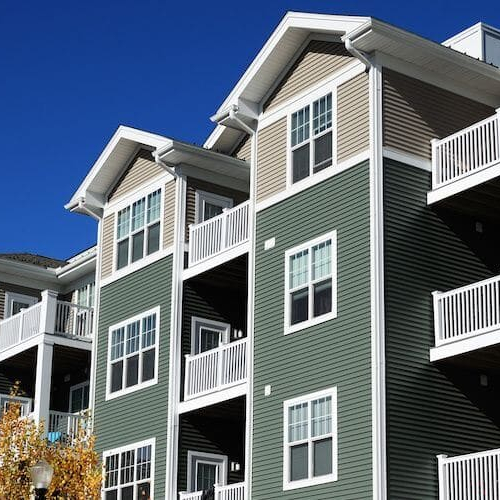Refinancing your condo: A complete guide
Contributed by Tom McLean
Oct 27, 2025
•6-minute read

If you took out a mortgage to buy a condominium, you may wonder if you have the same opportunities to refinance your loan as someone who bought a single-family house. The answer is yes, you can refinance a condo for the same reasons you would refinance a house, such as reducing your interest rate, changing your loan term, or borrowing your home equity.
How is refinancing a condo different from refinancing a house?
Refinancing a condo is very similar to refinancing a house.
The primary difference is that your lender will want to evaluate your condo association, which is similar to a homeowners association (HOA). Your lender will want to make sure the condo association is financially sound and properly maintains the building before approving your refinance.
What is a condo association?
Condo associations are responsible for maintaining the common areas of your condo building. Key functions include:
- Maintaining insurance on the building that houses individual condos
- Maintaining the property’s amenities
- Handling homeowner disputes
- Acting as fiduciaries of community funds
When you buy a condo, you agree to that building’s covenants, conditions, and restrictions, which set rules for how you can use your property.
If you fail to meet the CC&Rs or pay your condo fees, the association could place a lien on your property, which can prevent you from refinancing.
What lenders need to know about your condo association
When you go to refinance your condo, lenders will want to review your condo association to verify a few key criteria.
- Is your association on the approved list of Federal Housing Administration or Veterans Affairs condominium developments?
- Does it meet condo requirements set by Fannie Mae or Freddie Mac?
- Is it in good financial standing?
- Is it on top of major repairs that could affect your condo unit, such as roof maintenance?
If these requirements aren’t met, the lender may not agree to refinance your loan.
4 reasons to refinance your condo
There are good reasons to refinance your condo, from reducing your monthly payment to paying off the loan more quickly. Refinancing is not free and takes some time, so it’s important to make the decision carefully and to be sure it’s worth doing.
1. Reduce your monthly payment
There are a few ways refinancing can reduce your monthly payment.
If today’s refinance rates are lower than your current loan’s interest rate, refinancing can reduce your monthly payment.
You also can extend your loan term to reduce your mortgage payments, though this may cost you more in overall interest.
Rocket Mortgage provides a free refinance calculator that can help you estimate how much you can save with different condo refinance rates.
2. Pay off your loan faster
If you reduce your mortgage loan term when you refinance, you can pay off your loan more quickly and save money on overall interest. This usually involves switching from a 30-year loan to a 15-year loan.
While a shorter term can save you money overall, it usually requires a larger monthly payment.
3. Stop paying for private mortgage insurance
If you bought your condo with a conventional mortgage and a down payment of less than 20%, you must pay for private mortgage insurance (PMI).
If you want to stop paying for PMI, there are several routes you can take.
If your home has increased in value and you can refinance it with more than 20% equity, you can get rid of PMI and stop paying the monthly fee.
This isn’t the only way to remove PMI when you reach 20% equity. You can also make a formal request from your lender to remove PMI. With this method you don’t have to go through a full refinance.
When you reach 22% equity, your lender is legally required to cancel PMI under the Homeowners Protection Act.
4. Borrow against your home equity
A cash-out refinance is when you take out a new mortgage based on your home’s current market value, pay off your original loan, and keep the difference in cash. You repay what you borrowed as part of your new mortgage.
There are good reasons to borrow against your home equity. Many homeowners do so to pay for home renovations or upgrades, consolidate high-interest debts, or pay education expenses such as college tuition. If you have a significant amount of home equity, cash-out refinancing can be a cost-effective way to borrow money.
How to refinance your condo in 8 steps
If you’re ready to refinance your condo, follow these steps.
1. Make sure your condo qualifies for refinancing
The first step is to ensure that your condo is eligible for refinancing. In some cases, the home type, issues with the condo association, or characteristics of the condo building can make refinancing difficult.
Condos are categorized as warrantable and non-warrantable. Warrantable condos meet requirements set by Fannie Mae and Freddie Mac or are eligible for a FHA loan or a VA loan. It’s easier to finance or refinance warrantable condos.
Lenders may decide a condo is ineligible for refinancing if:
- It’s used as a short-term rental
- One owner controls too many units in the building
- The condo association carries insufficient insurance
- The condo association is being sued
- The building operates as a timeshare
2. Apply with a lender
If your condo is eligible, the next step is to submit an application. This process is similar to applying for your initial mortgage, requiring you to provide the lender with a range of documents, including W-2s and tax returns. The lender will then verify your financial information during the underwriting process.
To get the best deal possible, compare offers from multiple lenders to find the one that offers you the best mortgage rates and overall deal.
3. Lock in your rate
If you like the rate that a lender offers when you apply to refinance your condo, you can lock in mortgage rates. Depending on the lender, you may be able to lock in your rate for 30, 45, or 60 days. Many lenders allow you to lock in a rate without a fee while others might charge for this service so it’s good to ask about the terms of this service.
Locking in the rate offered means that it won’t change during the closing process, which can save you from a surprise jump in costs if condo refi rates increase before you close.
4. Review your Loan Estimate
Each lender you apply with will provide a Loan Estimate. This document must be provided within 3 business days of receiving your application, and it includes an estimate of the interest rate and closing costs for your new loan.
This isn’t an official contract, and the details may change slightly, but it will give you a good sense of what your loan will cost and help you decide which lender to move forward with.
5. Schedule an appraisal
To confirm your condo’s value, the lender will schedule an appraisal, much like the appraisal that occurred when you first bought the home. Your condo serves as collateral for the mortgage, so the lender will want to ensure it’s worth enough to secure the debt.
An appraiser will visit your property and inspect it to make sure it’s worth as much or more than the amount you’re borrowing.
6. Complete underwriting
Underwriting is the process of examining your credit and financial information to make a final lending decision.
7. Verify your Closing Disclosure
When you get the final details of your loan, you’ll also get a Closing Disclosure. This document provides all the final details and terms of the loan, including:
- Interest rate and APR
- Loan term
- Projected payments
- Closing costs
- Origination fee
- Taxes paid at closing
- Escrow costs
By law, lenders must provide the Closing Disclosure at least 3 business days before you close, giving you time to review it and make sure everything is accurate.
8. Close on your refinance
The final step in refinancing your condo is closing. This is the process where you sign all the paperwork and agree to the terms of your new loan.
Once you close, your old loan is paid off and replaced by the new one.
Alternatives to refinancing a condo
If you’re looking to get equity out of your condo, there are options other than cash-out refinancing that may be a better fit.
Home equity loans
A home equity loan is a second mortgage on your condo. The amount you can borrow will depend on how much equity you have in your home. You can use the proceeds of the loan for any purpose you like, though most homeowners use it to pay for major home renovations or to consolidate high-interest debts.
These loans can be appealing because they don’t require you to replace your existing loan. If your primary mortgage has a favorable interest rate, you may want to consider a home equity loan rather than refinancing.
If you’re thinking about a home equity loan, you can explore your options with Rocket Mortgage® to get a sense of how much you can borrow and what it will cost.
Personal loans
Getting a personal loan is another option for borrowing cash if you need it. Unlike home equity loans, personal loans don’t require collateral, so the amount you can borrow depends on your finances and credit. However, the lack of collateral also means interest rates tend to be higher.
Rocket Loans℠ offers personal loans. Check out the website to see what types of loans you can qualify for.
The bottom line: You can refinance your condo mortgage loan
Refinancing your condo mortgage lets you replace your existing mortgage with a new one that has a different interest rate or payment term. You can refinance to reduce your monthly payment, pay a lower mortgage rate, or borrow equity to pay for renovations, debt consolidation, or another major project.
If you’re ready to refinance, apply for a loan with Rocket Mortgage today.

TJ Porter
TJ Porter has ten years of experience as a personal finance writer covering investing, banking, credit, and more.
TJ's interest in personal finance began as he looked for ways to stretch his own dollars through deals or reward points. In all of his writing, TJ aims to provide easy to understand and actionable content that can help readers make financial choices that work for them.
When he's not writing about finance, TJ enjoys games (of the video and board variety), cooking and reading.
Related resources

8-minute read
How much does it cost to refinance a mortgage?
The cost to refinance a mortgage depends on your closing fees, which typically total 3% - 6% of the loan balance. Learn more about average refinancing costs....
Read more

8-minute read
8 great tips for refinancing your mortgage
Not sure what to look for or expect when refinancing your mortgage loan? Discover 8 refinancing tips to guide you and help you decide what’s right for you...
Read more

7-minute read
Refinancing your mortgage: Requirements explained
Refinancing your home has its benefits, but there are conditions to meet before you apply. Use this guide to understand mortgage refinance requirements.
Read more